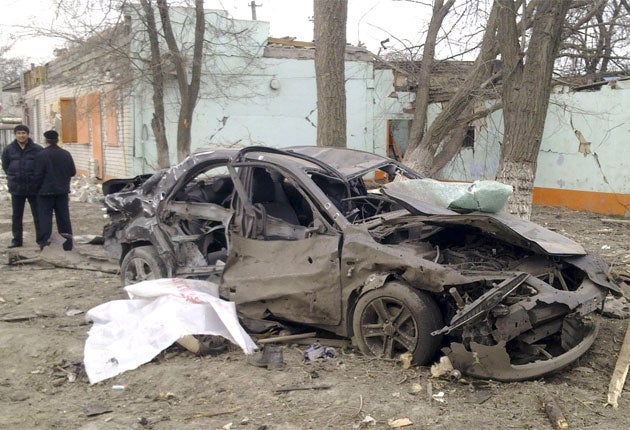Chechen rebel leader claims Moscow attacks
Russian accuses Georgia of aiding militants as Dagestan becomes the latest target

A Chechen rebel leader last night claimed responsibility for the Moscow suicide bombings and promised more bloodshed to come, as Russian officials pointed the finger at Georgia for abetting the militants.
In a four-and-a-half-minute video posted on a separatist website, Doku Umarov said that Monday's twin attacks on the capital's underground system, which killed 39 people, were revenge for a gun battle in February in Ingushetia, where both insurgent and civilians were killed. "Both of these operations were carried out on my command and will not be the last," Umarov was shown saying against a background of grassy woodland.
Earlier in the day, there were two more attacks in the southern Russian region of Dagestan, killing 12 people and injuring 29. A suicide bomber in a car detonated his explosives as police chased the vehicle in the town of Kizlyar, near the border with Chechnya.
As investigators and locals gathered at the scene, a second bomber approached wearing a police uniform and detonated his bomb, killing the town's police chief, among others. "Yet another terrorist act has been committed. I do not rule out that it is one and the same gang acting," Vladimir Putin, the Russian Prime Minister, told a government meeting.
Russian security sources have claimed that a cell of more than 20 suicide bombers could be primed to hit targets across the country. Calling the attacks "a crime against Russia", Mr Putin ordered his interior minister, Rashid Nurgaliyev, to bolster the police presence in the North Caucasus.
The claims of Georgian complicity in the attacks came from the head of Russia's Security Council, Nikolai Patrushev. In an interview in the Kommersant newspaper yesterday, he said that terrorists from the North Caucasus were the most likely culprits, but that they may have got help from abroad.
"For example, there is Georgia and its leader [President Mikheil] Saakashvili, whose behaviour is unpredictable," said Mr Patrushev, who was formerly the head of the FSB security service. "He has already started a war once, and we can't exclude that he will do so again. We had information that certain employees of the Georgian secret services kept up contact with terrorist organisations in the Russian North Caucasus," he added.
Georgia and Russia fought a war over South Ossetia in 2008, and the allegations recall complaints from Russia nearly a decade ago that Chechen fighters used remote mountain areas of Georgia as a base.
Most Georgian analysts dismissed the current claims as outrageous, with some even suggesting that they might form part of a pretext for new military action against Georgia. The opposition politician Nika Laliashvili called for an urgent convening of the National Security Council. "Patrushev's statement can only be seen in its political context, and could be the basis for a new war against Georgia," he said.
The Georgian deputy foreign minister, David Jalagania, said the accusations were a way of deflecting attention from Russia's internal problems. "By making such statements ... representatives of the Kremlin try to avoid responsibility for their professional impotence and incompetence."
In his video, Umarov – who styles himself as the "Emir of the Caucasus Emirate" – said it was he who had ordered the attacks, after a "massacre" of civilians who had been gathering wild garlic in February. Official Russian sources say the gun battle was between security forces and militants, with four civilians caught in crossfire.
Umarov, who spoke in heavily accented Russian, said ordinary Russians only knew the war in the Caucasus from television, and Monday's attacks were meant to bring the battle to their streets. Monday's bombers, he said, had been primed to "destroy the infidels and to send a greeting to the FSB".
Join our commenting forum
Join thought-provoking conversations, follow other Independent readers and see their replies
Comments
Bookmark popover
Removed from bookmarks